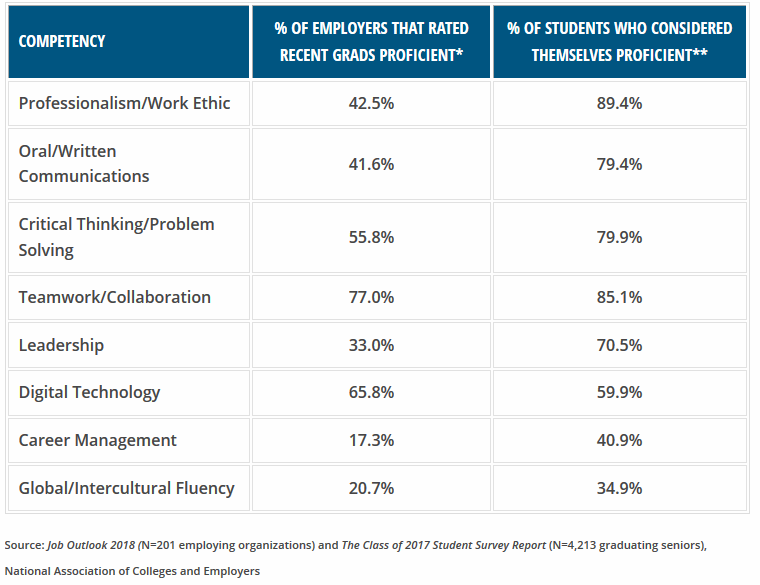Develop the Skills Your Employer Wants
By Lauren Beam (’07), Associate Director, Mentoring and Alumni Personal & Career Development, Wake Forest University
Recently the National Association of Colleges and Employers (NACE) published their 2018 Job Outlook Report and Class of 2017 Student Survey Report. In their article, “Are College Graduates Career Ready?” (February 19, 2018), their report findings revealed that the difference between a recent college graduate’s perception of their proficiency towards eight career readiness competencies and how their employers perceived their proficiency towards these competencies was significant. For recent graduates and young professionals, there is still a lot to learn in the world of work post-college. Below is a list of those key areas for growth and development and how recent graduates and employers rated their proficiency:
So as a young professional, how can you further develop these critical skills that your employer is seeking? Check out these quick tips that you can start incorporating into your daily work practices today!
Professionalism/Work Ethic: Seek out colleagues and other professionals in your work space who you admire. Take them out for coffee or lunch and ask them for 3 key pieces of advice for enhancing your professional presence in the office and/or strengthening your work ethic. Then, select a few of the pieces of advice to work on and incorporate into your own professional practice.
Oral/Written Communication: Public speaking and writing emails, reports, or business plans often look much different from oral or written assignments you may have completed in an academic setting. The next time you have a big presentation or submit a written document, ask a teammate or manager for feedback. What did you do well? How could you improve? Are there other opportunities to practice your public speaking and written communication skills?
Critical Thinking/Problem Solving: Take the initiative to brainstorm potential solutions for a problem or issue facing your team or organization that you have identified. Write up your proposed solution with research to back up your idea. Then, share it with the appropriate person, perhaps your manager. Even if your idea is not utilized, you are demonstrating your ability to identify problems and seek solutions without having to be asked to do so, and exercising your critical thinking muscle. Win-win for you and your organization!
Teamwork/Collaboration: Working on a project that will likely impact one of your colleague’s assignments? Reach out and set up a meeting to chat about the impacts and potential partnership with that individual. Showing that you’re a team player who is aware of how your work affects others will be recognized by your manager and colleagues. Also, seek out feedback from colleagues after a team project is complete and ask what you did well and how you could improve on future projects.
Leadership: Seek out training and professional development opportunities within (or outside of) your organization to develop your leadership skill set. You don’t have to be in a managerial role to be a leader. Attend online trainings, in-person workshops, or conference session on topics such as strategic vision and goal-setting, motivating others, teamwork and collaboration, and managing up (with your manager) and down (with your future direct reports).
Digital Technology: As someone in your 20’s or 30’s, you likely have a competitive advantage over your older colleagues when it comes to technology. If that’s the case, find opportunities to mentor and educate others around tech tools in which they want to learn more – social media, video creation and editing, graphic design, to name a few. Your willingness to coach those colleagues around you will be seen as a value-add.
Career Management: Once you’ve landed that first post-college job, the process of managing your career path doesn’t end there. It’s a lifelong task that requires great intention and thought. Get started by seeking out a mentor (or mentors), either within your company/industry or outside of it, to help you think through where you are now and where you want to go. Check out these resources and tips for seeking out mentorship.
Global/Intercultural Fluency: Identify your intercultural competency gaps, particularly as it relates to your work and company’s clients and/or goals. Then, find opportunities to get exposure to or training around global/intercultural awareness. For example, if your organization serves a large number of Spanish-speaking clients, seek out opportunities to learn more about cultural norms and communication styles. Or, hone your Spanish-speaking skills through a free online course. Additionally, many companies now offer diversity/intercultural awareness trainings as well as workshops related to LGBTQ populations, implicit/explicit bias in the workplace, and gender issues, etc.
For more tips and advice on how to develop the skills that your employer wants, we recommend checking out The Muse.

